1. Meticulously following the Achardharma (Code of righteous conduct) according to the four varnas (Classes) and Ashrams (Stages of life).
2. Following the Path of Yoga and initiation through Shaktipat (Self-realisation by transmission of spiritual energy from the Guru).
3. Following sectarian rules (discipline) is important.
4. Performing rigorous rituals and undergoing physical hardship.
5. Adhering firmly to norms of sovale-ovale.
6. Earlier, most Idols had only one face. However, in the present times an Idol with three faces is common. Instead of an Idol, in some places paduka (Wooden slippers) and the Audumbar tree are worshipped.
7. Devotees of Deity Datta read the Holy text Gurucharitra , recite it aloud and hear its recitation with great devotion and bhav (Spiritual emotion).
8. Satyadatta-puja (Ritualistic worship), like the Satyanarayan-puja.
9. Before commencing the ritualistic worship of Deity Datta, drawing sattvik rangolis associated with the Datta Principle
Especially on Thursday and on Datta Jayanti, draw sattvik rangolis which attract and emit Datta Principle, at home or in the temple. Due to these rangolis, the environment is charged with the Datta Principle and the devotees benefit from it. Fill sattvik colours such as yellow, blue, pink in these rangolis.
10. Some daily rituals related to the worship of Deity Datta
Every Deity has a specific science underlying its worship. This implies that performing every ritual in a specific manner during the worship of a specific Deity, has a specific science underlying it. Due to this ritual, the devotee is able to imbibe maximum Principle of that Deity. The table ahead provides details of daily rituals pertaining to the worship of Deity Datta compiled by Mrs. Anjali Gadgil.
Act of worship |
Knowledge about the act |
| 1. Before worshipping Deity Datta, how should the worshipper apply gandha (Sandalwood paste) to himself ? | Applying a vertical tilak (just as Shrivishnu has on Him) with the ring finger |
| 2. With which finger should gandha be applied ? | With the ring finger |
| 3. Offering flowers
A. Which flowers should be offered B. In what number? C. How should the flowers be offered D. In what shape should the flowers be offered |
Jai (Common jasmine) and nishigandha (Tuberose) Seven or in multiples of seven The stalk should be towards the Deity Hollow rhombus shape |
| 4. Waving incense- sticks
A. Incense-sticks of which fragrance should be waved for tarak (Saviour form) worship? B. Incense-sticks of which fragrance should be waved for marak (Destroyer form) worship? C. In what number D. What should be the method of waving incense-sticks? |
Chandan, kevada (Screwpine), Chameli (Jasmine), Jai (Common jasmine) and Ambar Heena Two Holding it between the thumb and the index finger of the right hand, and moving it three times in a clockwise direction |
| 5. Which fragrance should be offered ? | Vala (Vetiver) |
| 6. Minimum of how many pradakshinas (Circumambulations) should be performed around Deity Datta? | Seven |
11. Sadhana mantra of some sects – ‘Shri Gurudev Datta’
Deity Datta is Gurudev (Spiritual Master). He is supposed to be worshipped in the form of the Guru. Various forms of worship, for example – puja, Arati (Ritual of waving a lit lamp in front of a Deity), bhajan (Devotional songs) etc. bestow benefit of the Principle of the Deity. However, since all these have their limitations, the benefit obtained is also limited. For continuous benefit from the Deity Principle, worship of the Deity should also be continuous. The only form of worship that can be continuous is chanting. Deity Datta has several Names. The chant of His Name ‘Shri Gurudev Datta’ is most common. Devotees of Deity Datta should chant this Name continuously.
To imbibe maximum extent of the Deity Principle, recitation of the chant should be appropriate from the spiritual perspective.
Since Deity Dattatreya is the Supreme Guru, the Guru-disciple tradition (in which the Guru is a human being) did not continue in the Datta sect.
12. Shri Datta Jayanti (Birthday of Deity Datta)
On the Pournima (Full moon day) in the Hindu lunar month of Margashirsha (approximately in December), devotees of Deity Datta celebrate the festival of Datta Jayanti. To read more about the celebration of Datta Jayanti, please visit : https://www.sanatan.org/en/a/2506.html
13. Essential worship as per the times
‘Vyashti sadhana’ means worshipping and abiding by Dharma for individual spiritual progress. To increase the sattvikta of the society, it is essential to perform sadhana and abide by Dharma, and also encourage the society to do the same. This is known as ‘samashti sadhana’. To achieve completeness in worship, it is essential that the worshippers of Deity Datta perform vyashti as well as samashti sadhana.
A. Providing Dharmashikshan (Education on Dharma) to the society on the worship of Deity Datta
If we understand the underlying science and abide by Dharma appropriately, the result will be more productive. Hence, providing Dharmashikshan to the society as per individual ability on the various rituals included in the worship of Deity Datta and its underlying science is a superior form of samashti sadhana for the devotees of Deity Datta as per the present times.
B. Preventing denigration of Deities is the essential worship as per the present times
Today, Deities are being denigrated in various ways. Anti-Hindu artist M.F. Hussain sketched nude, vulgar pictures of Hindu Deities and put them up for sale. Deities are also being insulted through speeches and books etc. Deities are being used as models in advertisements to promote products. People in the attire of Deities beg for alms. Denigration of any kind is a blow to the faith of the devotees. Hence, this amounts to harming Dharma. Preventing harm to Dharma in the present times amounts to abiding by Dharma and is worship at the samashti level.

 Main places of pilgrimage of Deity Datta
Main places of pilgrimage of Deity Datta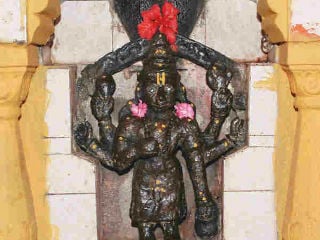 The ancient seat of Deity Datta at Shrikshetra Rakshasbhuvan : Varad Dattatreya temple
The ancient seat of Deity Datta at Shrikshetra Rakshasbhuvan : Varad Dattatreya temple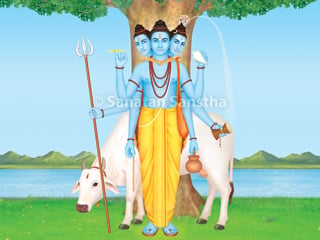 Spiritual reasons for the varying and same complexion of the trinity of Deities and also...
Spiritual reasons for the varying and same complexion of the trinity of Deities and also...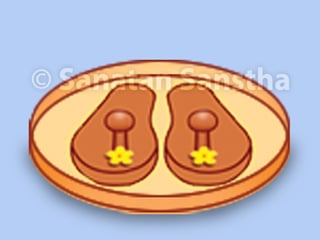 Datta Jayanti
Datta Jayanti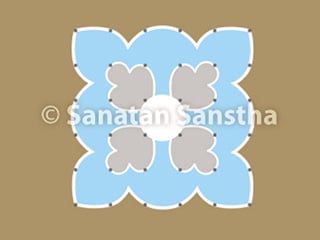 Rangolis to attract and emit Deity Datta tattva (Principle)
Rangolis to attract and emit Deity Datta tattva (Principle)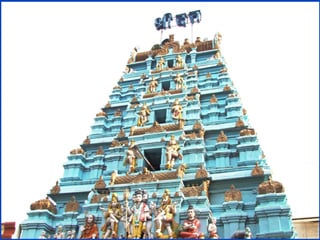 Main Pilgrim places of Deity Datta
Main Pilgrim places of Deity Datta